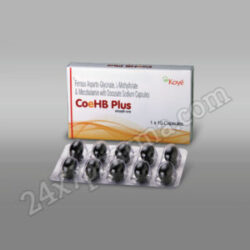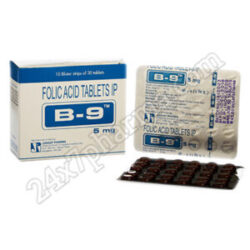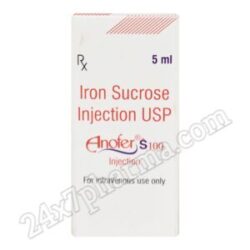What is Zyrop 4000 Injection?
Zyrop 4000 Injection is a medication primarily used to treat anemia, particularly in patients suffering from chronic kidney disease (CKD) or those undergoing chemotherapy. It belongs to a class of drugs known as erythropoiesis-stimulating agents (ESAs). Zyrop 4000 contains the active ingredient Erythropoietin, a hormone produced by the kidneys that stimulates the bone marrow to produce more red blood cells (RBCs). This process helps in improving oxygen transportation in the blood and alleviating the symptoms of anemia such as fatigue, weakness, and shortness of breath.
Erythropoietin is naturally produced in the body, but when the kidneys are unable to generate sufficient amounts due to disease or other medical conditions, the Zyrop 4000 Injection can be administered to compensate for the deficiency and help manage anemia effectively.
How Does Zyrop 4000 Injection Work?
Zyrop 4000 Injection works by mimicking the natural hormone erythropoietin in the body. Erythropoietin is responsible for stimulating the production of red blood cells in the bone marrow. When someone has anemia, particularly in conditions like chronic kidney disease or in people undergoing chemotherapy, the body’s ability to produce enough red blood cells is impaired. Low levels of red blood cells reduce the amount of oxygen that circulates through the body, leading to symptoms such as weakness, fatigue, and dizziness.
When Zyrop 4000 is administered, the synthetic erythropoietin binds to specific receptors in the bone marrow. This signals the body to produce more red blood cells, which increases the overall RBC count. As a result, the body is better equipped to transport oxygen to different tissues and organs, alleviating the symptoms of anemia. This process improves energy levels, reduces fatigue, and enhances the overall quality of life in affected patients.
Uses of Zyrop 4000 Injection
Zyrop 4000 Injection is mainly used in the treatment of:
- Anemia in Chronic Kidney Disease (CKD): Patients with CKD often experience a reduction in erythropoietin production by their kidneys, leading to anemia. Zyrop 4000 helps to replace this hormone and stimulate red blood cell production.
- Anemia Caused by Chemotherapy: Many cancer patients undergoing chemotherapy experience anemia as a side effect of the treatment. Zyrop 4000 helps to boost RBC production and improve hemoglobin levels in these patients.
- Anemia in Premature Infants: In some cases, premature infants develop anemia due to underdeveloped kidneys. Zyrop 4000 can be administered to increase red blood cell production and support oxygen delivery throughout their bodies.
- Surgery-Related Anemia: Zyrop 4000 is sometimes used in patients who are undergoing surgery and are at risk of developing anemia or require a blood transfusion.
Benefits of Zyrop 4000 Injection
The primary benefit of Zyrop 4000 Injection is its ability to effectively manage and treat anemia, especially in patients with chronic kidney disease or those undergoing chemotherapy. Some of the key benefits include:
- Increased Red Blood Cell Production: Zyrop 4000 stimulates the bone marrow to produce more red blood cells, helping to improve oxygen delivery throughout the body.
- Improved Quality of Life: By alleviating symptoms like fatigue, weakness, and shortness of breath, Zyrop 4000 can enhance a patient’s overall well-being and ability to perform daily activities.
- Reduced Need for Blood Transfusions: By boosting red blood cell levels naturally, Zyrop 4000 can reduce the need for blood transfusions, which carry risks such as infections or immune reactions.
- Tailored Treatment for Chemotherapy Patients: Zyrop 4000 is particularly beneficial for cancer patients who develop anemia as a side effect of chemotherapy, offering a non-invasive solution to manage this condition.
Side Effects of Zyrop 4000 Injection
Like any medication, Zyrop 4000 Injection can cause side effects, though not everyone will experience them. Common side effects include:
- Increased Blood Pressure: Some patients may experience a rise in blood pressure, which needs to be monitored regularly.
- Injection Site Reactions: Pain, redness, or swelling at the injection site is common but usually subsides quickly.
- Headaches: Some patients may experience mild to moderate headaches.
- Joint or Bone Pain: As the medication stimulates bone marrow activity, joint or bone pain may occur temporarily.
- Blood Clots: In rare cases, Zyrop 4000 can increase the risk of developing blood clots, especially in patients with a history of clotting disorders.
If any severe side effects or allergic reactions such as difficulty breathing, chest pain, or unusual swelling occur, medical attention should be sought immediately.
Warnings & Precautions
Before starting treatment with Zyrop 4000 Injection, certain precautions and warnings should be considered:
- Pre-existing Conditions: Patients with uncontrolled hypertension should use Zyrop 4000 cautiously, as the injection may further increase blood pressure.
- Blood Monitoring: Regular monitoring of hemoglobin levels is necessary to avoid overproduction of red blood cells, which can lead to complications such as blood clots or cardiovascular issues.
- Cancer Patients: Zyrop 4000 should be used under strict medical supervision in cancer patients as it may sometimes accelerate tumor growth.
- Allergic Reactions: If you are allergic to erythropoietin or any other components of the injection, inform your doctor before taking Zyrop 4000.
- Pregnancy & Breastfeeding: The effects of Zyrop 4000 on pregnant or breastfeeding women are not fully known, so discuss its usage with your healthcare provider if you are pregnant or nursing.
FAQs about Zyrop
Q1.How long does it take for Zyrop 4000 to show results?
Ans: Most patients start noticing improvements in their anemia symptoms within 2 to 6 weeks of starting the treatment. However, regular blood tests will be required to monitor your progress.
Q2.Can Zyrop 4000 cure anemia?
Ans: Zyrop 4000 does not cure anemia but helps manage and alleviate its symptoms by increasing red blood cell production.









